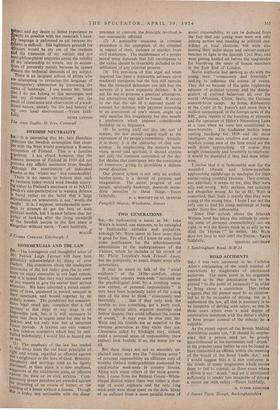TWO GENERATIONS
Snt,—So fashionable a talent as Mr. John Wain's is bound, one supposes, to be entangled in fashionable attitudes and prejudices, although Mr. Wain seems to have more than is good for him. For all I know he may have some justification for the schoolmasterish admonitions to the undergraduates of the Thirties, which he includes in his review of Mr. Philip Toynbee's book Friends Apart, but the pomposity, as usual, drapes some silly generalities.
It may be smart to talk of the " social euphoria " of the 1930s—comfort, cheap travel, long country week-ends " matched on the psychological level by a crushing sense, now extinct, of personal responsibility." It may have been hopelessly naive of the young men of the time to think " consciously and
feverishly . . that if they only took the trouble to join something, get a party card, wear a special shirt,. organise meetings and bellow slogans, they could influence the course of events." It may even be true that Mr. Wain and his friends are as superior to the wartime generation as they claim they are. Cleverness aided by hindsight may, indeed, make a personal sense of responsibility (how extinct) look foolish; if so, the worse for us all.
But these things are not so smoothly ex- plained away; nor was the " crushing sense" of personal responsibility an affliction only of wealthy Oxford undergraduates cushioned by comfortable week-ends in country houses. Along with many others of the same genera- tion, I come from the Bethnal Green—White- chapel district where there was rather a shor- tage of social euphoria and the only long week-ends were those spent on the dole. Many of us suffered from a most painful bump of social responsibility, as can be deduced from the fact that our young men were not only joining parties and standing as political can- didates in local elections, but were also leaving their tailor-shops and cabinet-makers' benches to fight in the Spanish Civil War, and were getting hauled up before the magistrates for bloodying the noses of fascist marchers in the East End of London.
Social euphoria had nothing to do with the young men " consciously and feverishly " seeking to influence the course of events. They did so because of the quite frightening advance of political tyranny and the disinte- gration of civilised behaviour all over the world—Abyssinia, China, Spain, the German concentration camps. At home, Ribbentrop at the Court of St. James's and more than a million unemployed; in the foreign news of the BBC, daily reports of the bombing of peasants and the operation of Hitler's Nuremberg Laws at a time when we were less conditioned to mass-brutality. The Gadarene leaders were rushing headlong for 1939 and the more intelligent, the more sensitive and conscience- stricken young men of the time could see the swift doom approaching. Of course they sought consciously and feverishly to intervene: it would be shameful if they had done other- wise.
I realise that it is fashionable now for the wounded liberals and fellow-travellers approaching middle-age to apologise for their embarrassing youthful passions. They confess, too anxiously it seems to me, that they were silly and wrong. Silly, perhaps, but certainly not altogether wrong. So far as Mr. Wain is concerned, their fault is mainly that they were young at the wrong time. I hope I am not the only one to find his smug patronage at being under thirty-five unbearable.
" Since 1946 nobody above the Jehovah Witness level has taken this attitude [a crush- ing sense of personal responsibility]; are we right, or will the Sixties think us as silly as we think the Thirties ? " he writes. Mr. Wain doei not have to wait until the Sixties.—Youn
7 Sandringham Road, N.W.11


































 Previous page
Previous page